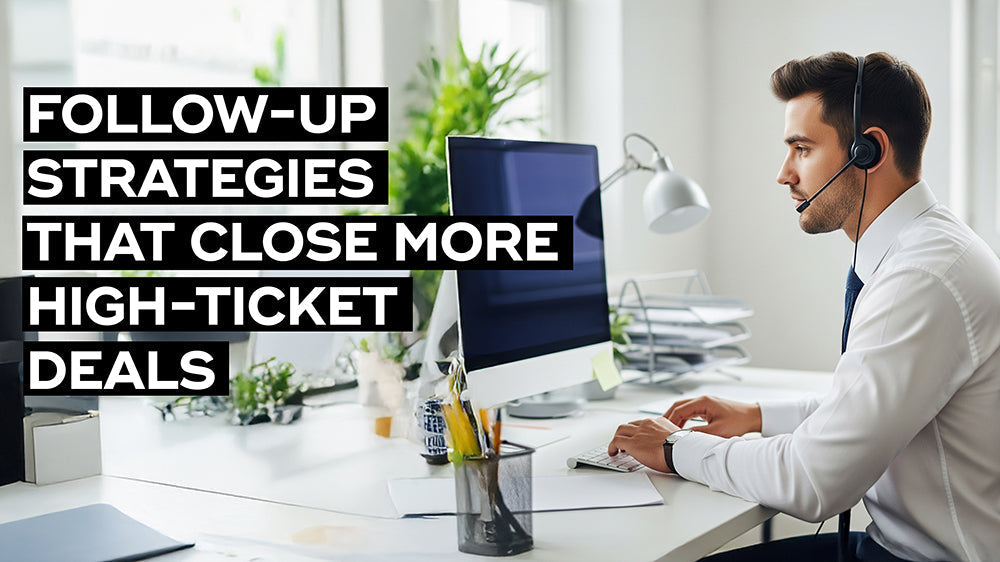
Let me ask you a question.
Think about the last time you had a promising high-ticket prospect who seemed very interested—but didn't close immediately.
You had a powerful sales call. They said, "I just need some time to think about it."
Then what?
Did you follow up diligently—or did you let that lead slip through your fingers?
Be honest with yourself.
The truth is, most high-ticket sales happen after multiple follow-ups. In fact, studies show that 80% of all deals close after five or more interactions.

Most salespeople treat follow-ups as an afterthought rather than a strategic necessity.
They tend to:
Give up after one or two unanswered messages.
Send generic "just checking in" emails.
Feel personally rejected and stop following up prematurely.
These mistakes cost you massive amounts of revenue.
Are your follow-ups strategic—or are you just hoping for a reply?

High-ticket buyers rarely buy instantly. They need reassurance, clarity, and repeated communication to trust the investment.
Your job as a high-ticket closer is to stay strategically engaged until they feel comfortable saying "yes."
High-ticket buyers often:
Require multiple interactions before making decisions.
Need repeated confirmations of value and trustworthiness.
Expect personalized attention throughout the buying process.
If you’re serious about closing high-ticket deals consistently, follow these proven strategies carefully.
The biggest mistake salespeople make during follow-up is sounding needy or desperate.
Generic messages like "Just checking in..." undermine your authority.
"Last time we spoke, you were facing challenges scaling your business. Has anything shifted since our conversation?"
"I recently helped someone in your exact situation double their revenue—would you like to hear how?"
Position yourself as an expert, not a seller.
Do your follow-ups position you as an advisor—or just another salesperson?

Timing is everything.
The longer you wait, the colder your prospect gets.
Your best chance to close high-ticket deals is within 48 hours after your initial meeting.
Send personalized messages within 24-48 hours.
Restate the urgency of solving their problem.
Proactively address objections before they voice them.
Are your prospects going cold because you delay your follow-ups?
High-ticket buyers dislike missing out on opportunities.
Utilize scarcity (limited availability) and social proof (demonstrated results) to encourage action.
"I have only one spot available for this month."
"Enrollment closes tomorrow—after that, no exceptions."
Share relevant client success stories.
Mention tangible results previous clients achieved.
"The last client who joined secured major results in 30 days. Only two spots remain—do you want in?"
Are your follow-ups clearly highlighting scarcity and credibility?
Beyond the basics, these advanced techniques can dramatically increase your closing rate.
Don’t rely solely on email.
Utilize personalized videos.
Schedule quick follow-up calls.
Send thoughtful, direct messages via social platforms.
Variety maintains engagement and feels more personal.

Every follow-up should feel customized.
Reference previous conversations specifically.
Mention unique challenges your prospect shared.
Include personalized insights or recommendations.
Provide value in every follow-up.
Send relevant articles, videos, or industry insights.
Offer helpful tips directly related to their specific challenges.
Is each follow-up adding genuine value—or just pushing for a response?
High-ticket selling is more psychology than sales tactics.
Understanding buyer psychology ensures your follow-ups resonate deeply.
Reciprocity: Providing value increases prospects’ desire to respond positively.
Familiarity: Regular, helpful communication builds trust and rapport.
Urgency: Clearly defined deadlines create action-oriented decisions.
To master follow-up, avoid these costly mistakes:
Not having a structured follow-up plan.
Taking rejections or silence personally.
Failing to track follow-up efforts meticulously.
Use clear systems like CRM tools to track follow-ups consistently.
HubSpot CRM
Salesforce
Monday.com
If you’re not converting after follow-ups, reassess these points:
Are you clearly communicating your value?
Are you handling objections effectively?
Are your follow-ups strategically timed?
Continual improvement ensures higher closing rates.
Persistence is crucial, but balance is key.
Follow-up every 2-3 days initially.
Gradually lengthen intervals after 1-2 weeks.
Stop after consistent silence for several weeks, leaving the door open for future engagement.
Non-responsiveness doesn’t always mean disinterest.
Vary your follow-up methods.
Change the angle or offer different information.
Politely ask if circumstances have changed.
Clear, concise communication is critical in follow-ups.
Be respectful of your prospect’s time.
Make your intentions clear and direct.
Maintain professionalism consistently.
Automating certain follow-up tasks frees your time without sacrificing quality.
Use autoresponders for basic reminders.
Automate value-based content delivery.
Reserve personalized effort for highly engaged prospects.
Your income as a high-ticket closer directly relates to your follow-up effectiveness.
Successful high-ticket closing is a disciplined, strategic follow-up game.
If you're tired of leaving money on the table, your next step is clear.
I developed Follow Up Secrets to give you a step-by-step blueprint on effective follow-ups:
Proven strategies for high-ticket follow-ups.
Techniques to handle objections effortlessly.
How to systematically turn prospects into high-paying clients.
Aspiring high-ticket closers
Seasoned sales professionals wanting higher conversions
Entrepreneurs aiming for consistent revenue growth
The money is truly in the follow-up. Are you ready to master it?
Click the link or the image below to access Follow Up Secrets today.
Click Here to Access Follow Up Secrets
Stop guessing. Start closing. Your future high-ticket deals depend on it.